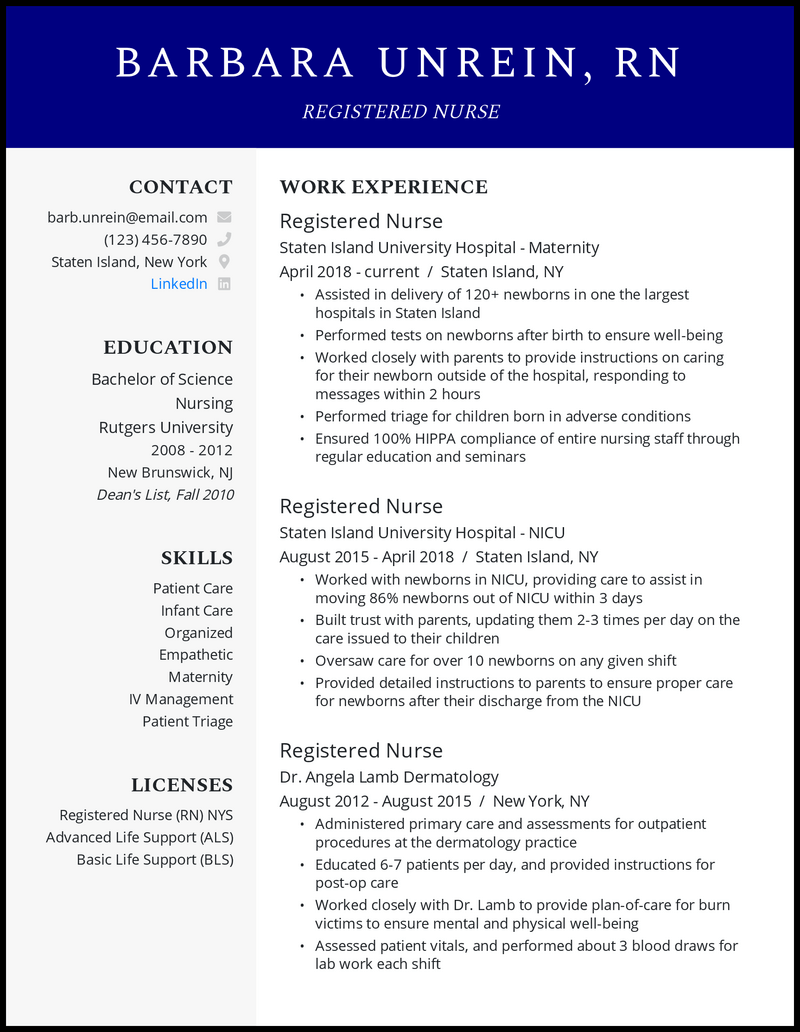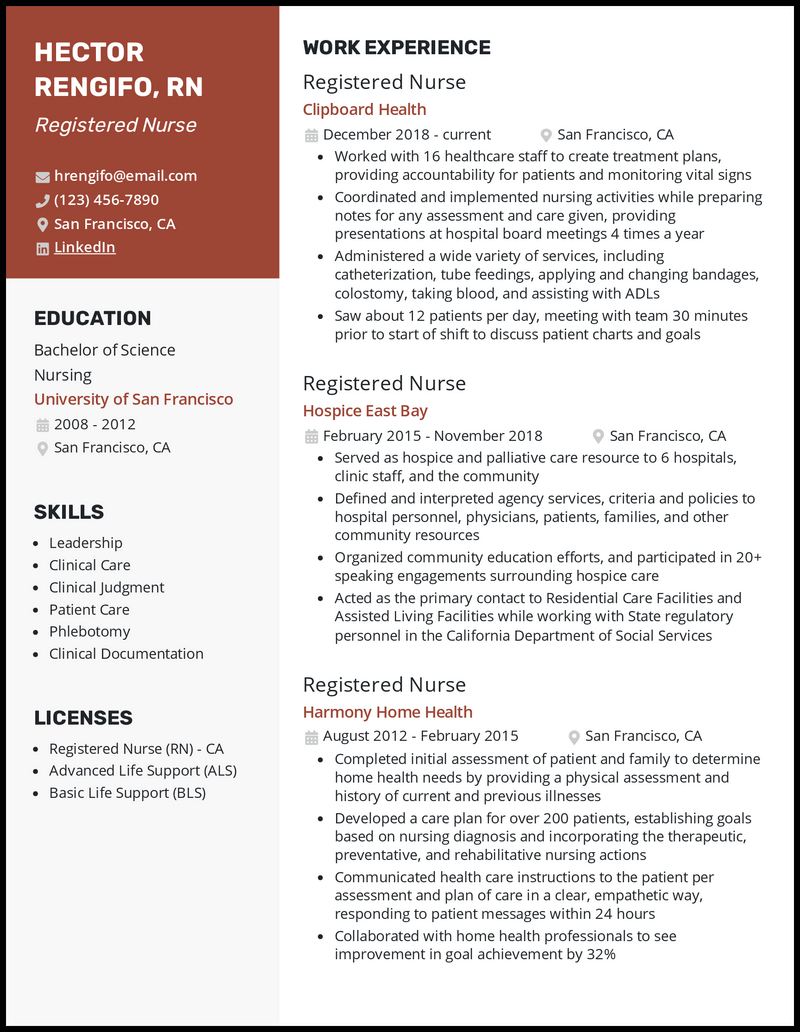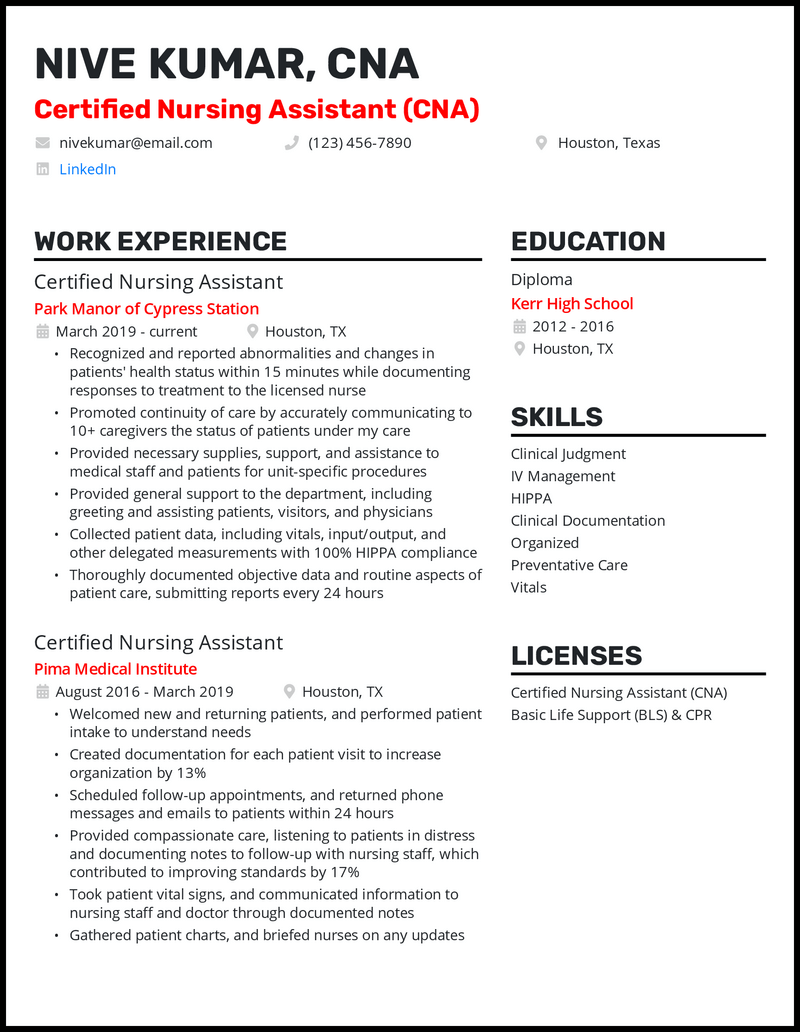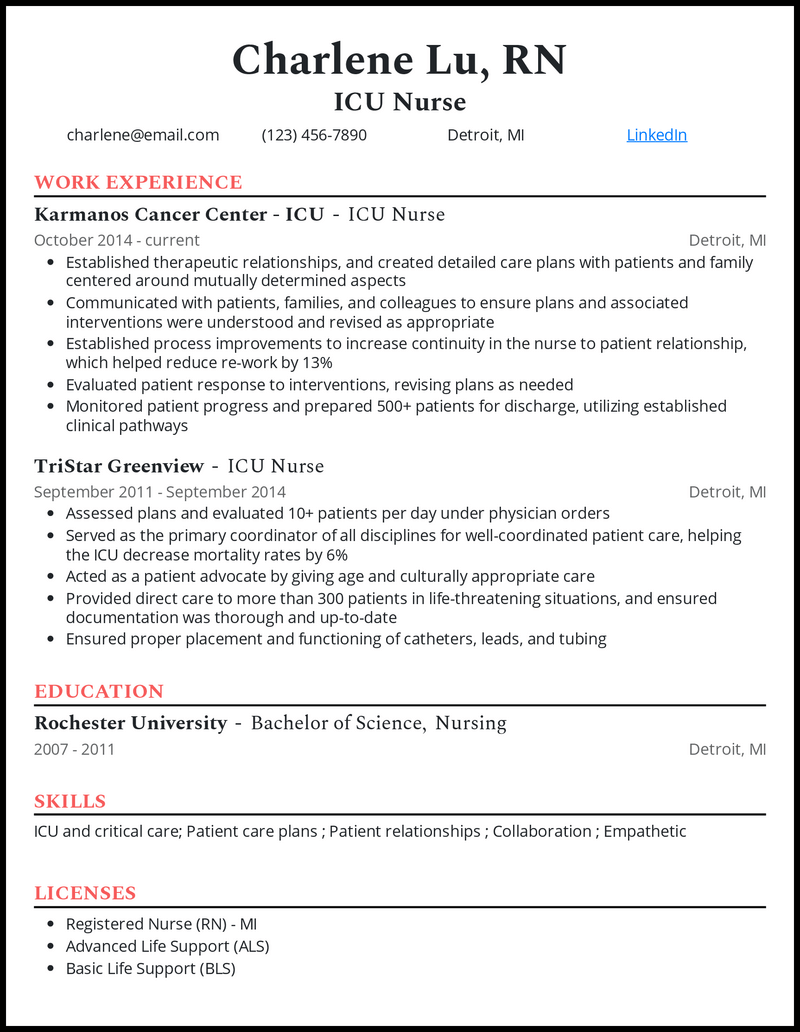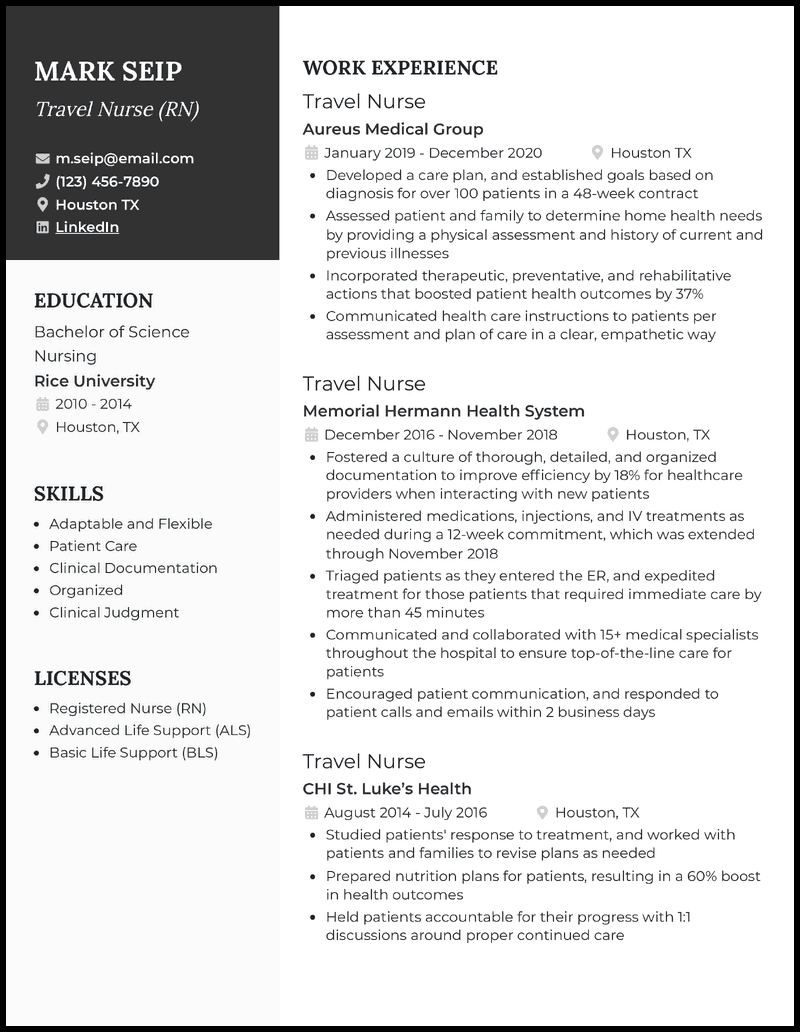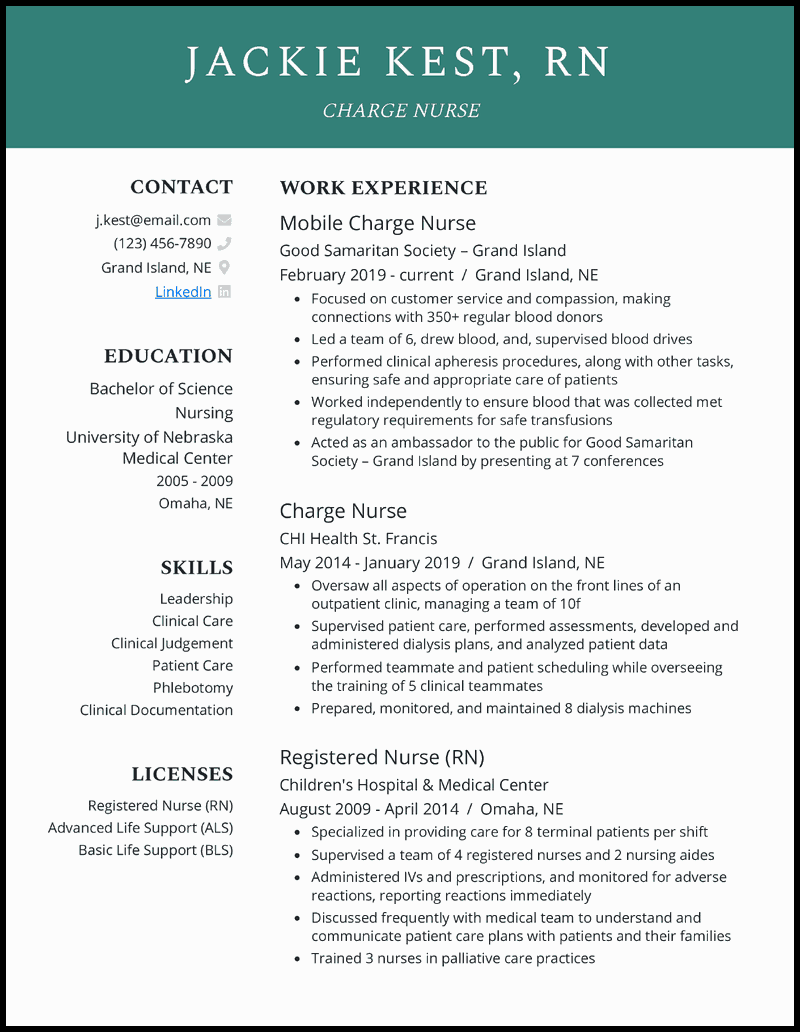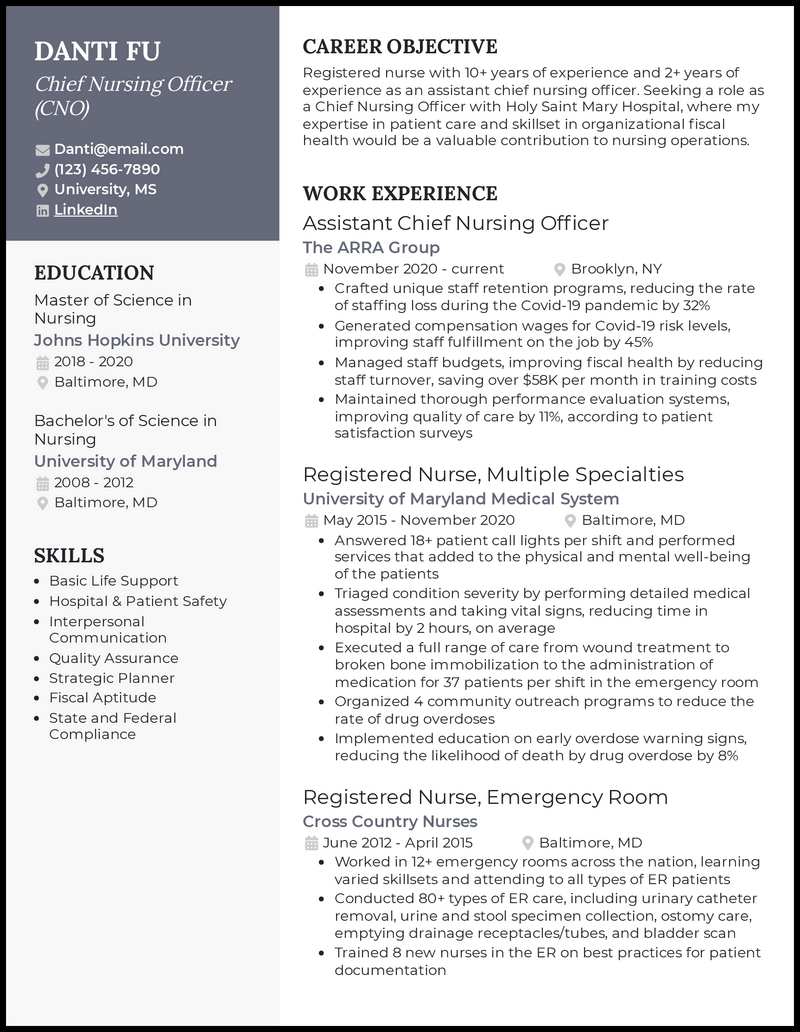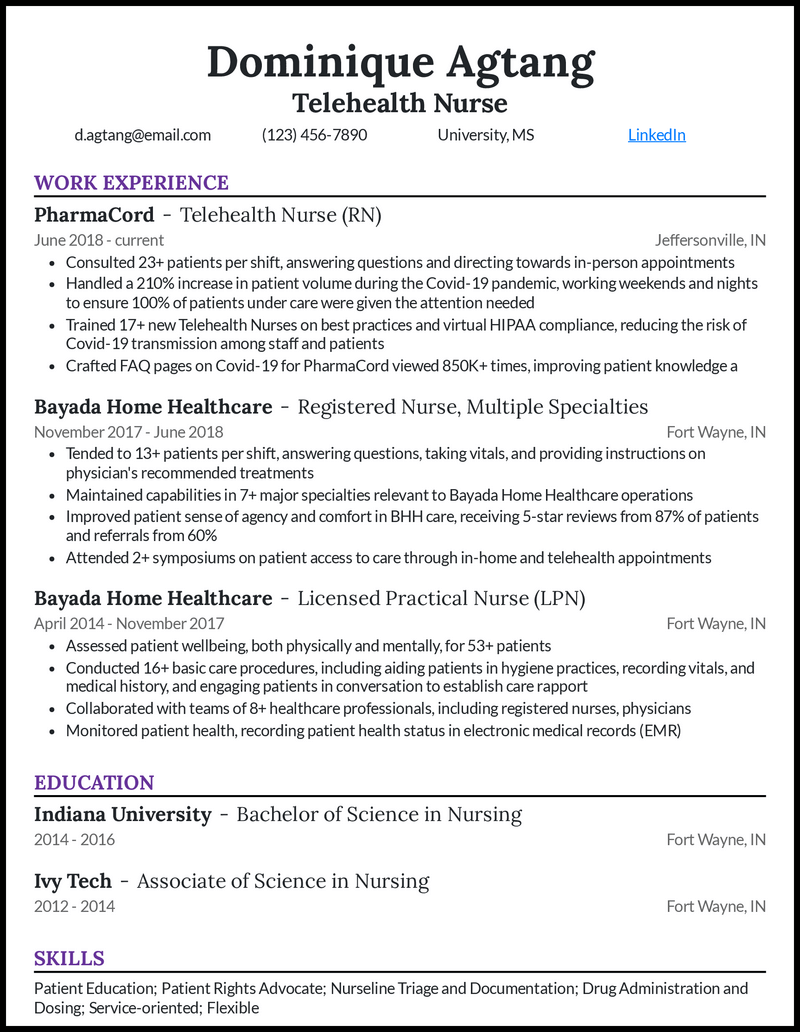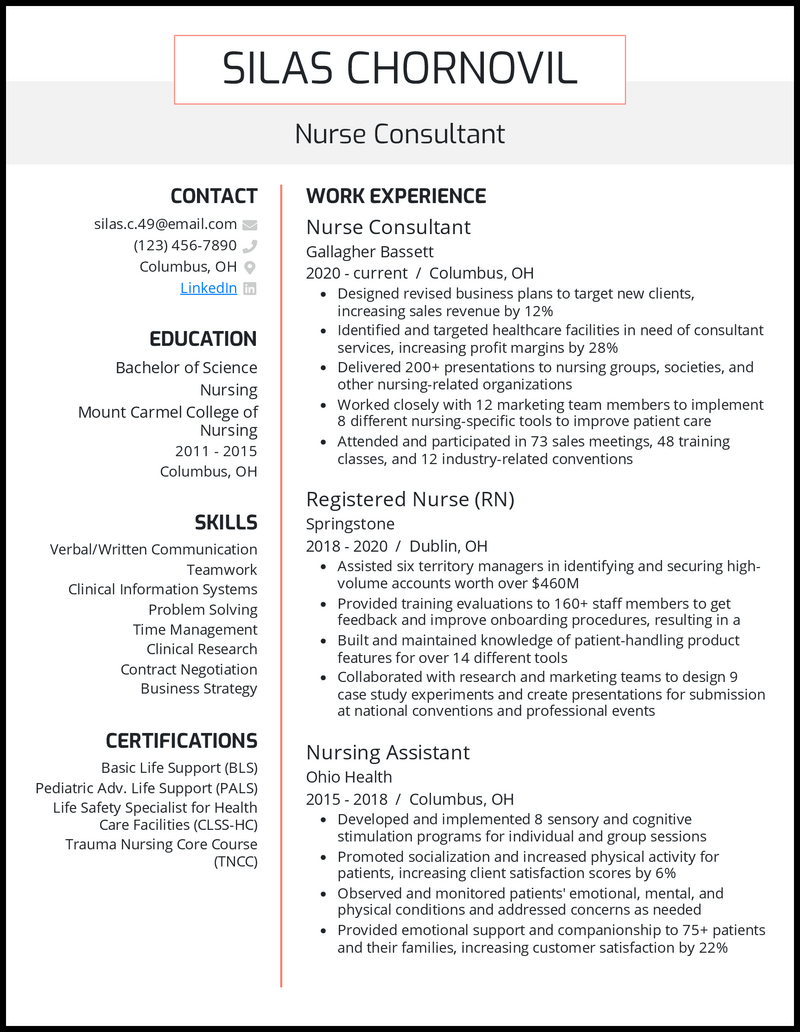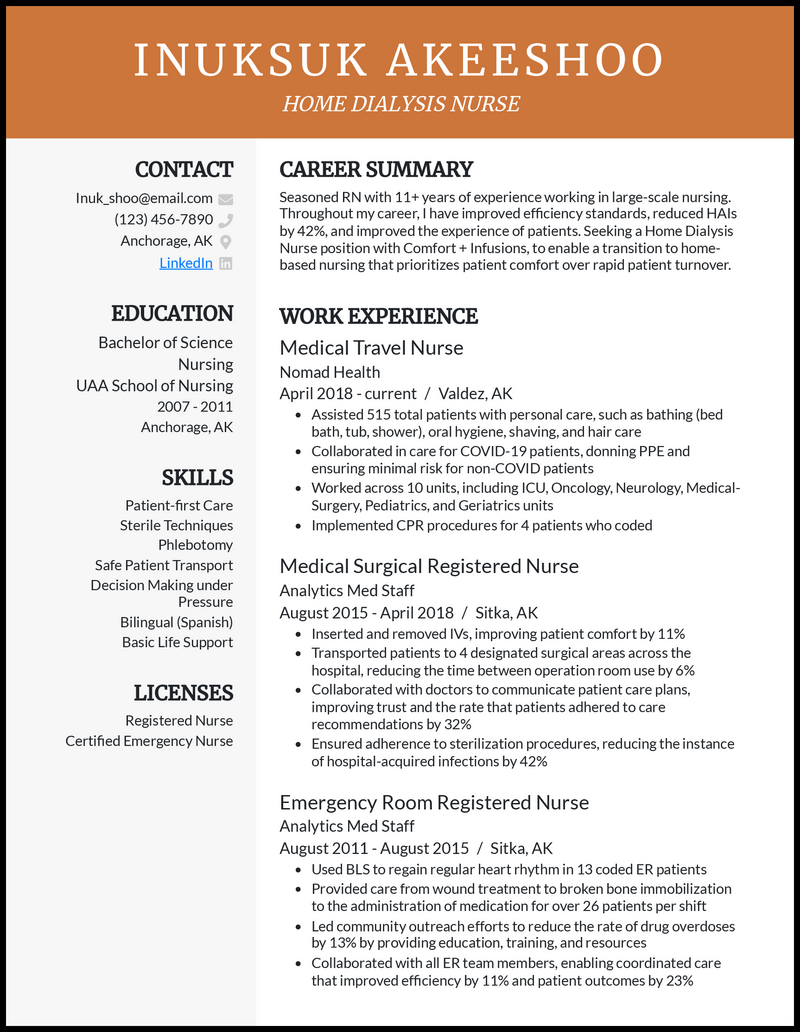
Nursing





Best for candidates with 3+ years of experience
Resume Builder
Like this template? Customize this resume and make it your own with the help of our Al-powered suggestions, accent colors, and modern fonts.
Although the demand for nurses is growing, getting a job in the nursing industry isn’t easy, especially if you’re making a start or submitting a letter of resignation at your current position.
How are you supposed to know how to write a stunning resume so employers will immediately want to hire you and create a cover letter detailing your accomplishments?
Getting into the nursing field is tough, so we analyzed dozens of nursing resumes to learn what works and what doesn’t to help you get a great nursing job.
No matter your specialty or where you are in your nursing career, we’ve got 35 nursing resume samples to help you make a resume online from scratch or update your current resume to get you your next nursing job in 2025!
Why this resume works
- Your nursing resume is the first contact between you and your employer, so you must ensure your resume makes a solid first impression.
- One of the quickest ways to do so is by including your licenses in your title. This clearly signals to the employer that you’re qualified for the position.
- Adding an optional licenses section is another way to demonstrate your abilities, so if you have the room, make sure to add that section.
- Once you’ve got the employer’s attention, they need to continue reading, which won’t happen if your nursing resume is generic.
- Instead, tailor your resume to the nursing job description. What keywords did they list? What responsibilities do they expect you to complete? Use this as your guide to include what employers most want to see.
Why this resume works
- Depending on your years of nursing experience, you may wonder if you need to submit a CV or a resume.
- Some professions require CVs for senior-level officials, while other industries are fine with a resume no matter their seniority level. Check the job description to see what kind of information the employer requires, so you know what to write.
- Because you have to include more work experience, you may be wondering how to condense everything on your experienced nurse resume.
- Try to demonstrate the different specific responsibilities you’ve had throughout your career. What kinds of clinical techniques have you done? For example, have you assisted with ADLs, administered particular tests, or diagnosed specific types of diseases?
Why this resume works
- As a nursing student, you’ve gained plenty of clinical experience during your rotations, but knowing how to include it on a resume can be difficult.
- The key is to be specific about what you contributed or learned during your time in school.
- How did you assist your peers or supervisors? Did you witness anything especially noteworthy? What did you learn? Listing details like these helps employers qualify your abilities.
- When writing your nursing student resume, you may face too much white space, which is an invitation to add a resume objective.
- While an objective is strictly optional, it’s a great way to convey your excitement for the position and some of your relevant skills.
Why this resume works
- Since you’re a new graduate, your experience during your clinical rotations can (and should) be included on your new grad nursing resume. It’s also important to list any other healthcare experience you have, whether it’s paid experience or volunteer work.
- If you lack experience, that’s okay! Just include more details about your clinical rotations. You can also mention non-healthcare-specific work experience if you have it.
- Your resume skills section should match keywords mentioned in the job description as honestly as is your reality.
- For example, does the job description talk a lot about compassionate care? Then you should include the phrase “compassion” in your skills section.
Why this resume works
- Even if you’re entering healthcare for the first time, don’t shy away from packing your new nurse resume with as many armamentarium skills as possible.
- Including devices and software such as Hill-Rom smart beds, Omnicell, PeraHealth’s Rothman, and Vocera Badge shows employers that you’re all ready to hit the ground running and help senior nurses treat patients with the latest gadgets in hand.
Why this resume works
- Did you start your career in a small way and have climbed the professional ladder to be here today? It doesn’t matter that you started as a babysitter. Use that to showcase determination in your LVN resume, and recruiters will pay attention.
- As you progress, unleash quantified achievements in your previous roles, emphasizing how you helped patients and improved outcomes (hint: reducing medication errors by 28% and enhancing patient safety).
Why this resume works
- Much like applying for an RN role, you should include your license right in your resume title (right after or below your last name). This effectively alerts the employer that you’re qualified for the role (and thus, deserve an interview).
- In addition to your title, if you have any certifications or additional licenses, include them on your resume in a designated section.
- If you’re struggling to know what to write on your CNA resume, it can help to look at CNA resume examples and local CNA job descriptions to determine what employers want to see and what metrics to include.
Why this resume works
- There’s a lot riding on your shoulders for this position so ensure you mention your management qualities in your RN BSN resume.
- Go beyond helping patients and list all the times you’ve helped doctors treat a condition more quickly or improved after-surgery recovery rates. Add how you’ve endeavored to assist patients remotely during tough times (if any) such as providing remote sessions during COVID-19.
Why this resume works
- Much like applying for an RN role, you should include your license right in your resume title (right after or below your last name). This effectively alerts the employer that you’re qualified for the role (and thus, deserve an interview).
- In addition to your title, if you have any certifications or additional licenses, include them on your resume in a designated section.
- If you’re struggling to know what to write on your CNA resume, it can help to look at CNA resume examples and local CNA job descriptions to determine what employers want to see and what metrics to include.
Why this resume works
- No LPN has the same responsibilities within every industry. Connect your strengths by highlighting your technical abilities according to the nursing job description on your LPN resume.
- If your current specialization is different from the job description, don’t stress! You should still be specific about your experience, but focus on transferable skills that go hand-in-hand with other fields.
- For example, do you specialize in long-term care, nephrology, or developmental disabilities? Include how you applied those abilities throughout your LPN resume.
- An impressive education, both what you know and what you’ve taught, is a strong indicator of expertise as an LPN.
- Of course, you need to include where you got your nursing degree, but don’t stop there! Adding a certifications or licenses section can show off your training and catch a hiring manager’s eye quickly.
Why this resume works
- For a nursing assistant resume that can show you’re up to snuff and boost your chances of scoring an interview, shine a light on your industry-relevant licenses.
- For instance, a Minnesota Nursing Assistant Certification and a Certified Home Health Aide (CHHA) license grab the recruiter’s attention and show that you’ve met the required professional standards. They paint a pretty picture of a candidate who, at the very least, deserves an interview.
Why this resume works
- How can you prove you’re the best nursing data manager in town? Well, give thought to highlighting your job-relevant technical skills in your nursing informatics resume to say you’re right in your element and worthy of a shot.
- But don’t forget that demonstrating relevant technical proficiency is not just about listing the tools (think Epic Systems, Quippe, Meditech, etc) you know inside out—anyone can do that. Our proposal? Show the potential employer how you applied the software, too, so they can separate you from the crowd that bluffs.
Why this resume works
- Tossing the same old generic nursing home administrator resume out there is like sabotaging your own job hunt – it’s the kind of drama you don’t want. How about we switch gears and finely tune your resume to perfection?
- Begin with a careful analysis of the job listing and grasp the matching qualifications, skills, and requirements that resonate with your own experiences. Found them? Fantastic! Now, strategically incorporate those golden nuggets into your resume. In addition, picture how Amanda flaunts her nursing license–if you’ve got similar credentials or those shiny certifications, mention them somewhere in the side column.
Why this resume works
- With a fantastic history in the field, whipping up an impressive psychiatric nursing resume should be a total breeze for you, right? But remember, you’ve got to ensure your wins get the spotlight they deserve.
- Take Sarah, for example. She didn’t just casually namedrop accomplishments like “reducing 30-day readmission rates by 14%” and “spreading awareness of mental health services among 1,280+ community members.” Nope. She made those wins pop out in her resume with bolding and underlining to wow the recruiter from the get-go.
Why this resume works
- Yes, you enjoy saving lives every day, but if your nursing manager resume is dead due to a poorly done education section, you risk missing out on the next exciting opportunity to transform lives.
- How far back should you go? You wonder. If you have a master’s degree in nursing or healthcare management, make that the centerpiece of your education section. Otherwise, a bachelor’s degree fits the bill! Of course, don’t forget to add the institution’s name and the year you graduated.
Why this resume works
- To work as a critical care nurse lead, you don’t have to be an expert from the start. Here, even small contributions from prior positions may make a big difference. Take a cue from Sarah’s critical care nursing resume and start by adding your first job.
- Gain promotion and assume a new role with greater responsibility after that. Use this to show your dedication by backing your achievements with numbers.
Why this resume works
- You know you’re in the big leagues when you’re creating a director of nursing resume. Accordingly, mention what recruiters love — complying with HIPAA regulations.
- List down all the variety of software you’re proficient in and write how you’ve used each right from the beginning of your career. Last but not least, never forget to add your RN license!
Why this resume works
- Much like caring for newborns, your NICU Nurse resume requires extra attention if you want to land a job on this coveted unit. Take the time to craft a career objective that demonstrates your passion for working with this special patient population.
- Use the career objective to frame your clinical experience through the lens of NICU by highlighting your ability to communicate with families or work in high-pressure environments.
Why this resume works
- Surgeons are always seeking cutting-edge technology that can unlock new medical capabilities. Showcase your expertise in working with these innovative systems—like robotic arms—to enhance your operating room nurse resume.
Why this resume works
- A school nurse is responsible for a broad and varied patient population: students. To succeed, you’ll need to implement processes that can support their many diverse needs.
- Are you skilled in using platforms specific to educational institutions, such as SchoolMessenger? Include them on your school nurse resume to prove that you’re prepared to handle the caseload.
Why this resume works
- As a telemetry nurse, you’re the heartbeat of the operation—literally. It’s up to you to monitor and protect the patient from a cardiac event during surgery.
- You can bolster your telemetry nurse resume by listing any special certifications that further qualify you for the task, such as Advanced Cardiovascular Life Support (ACLS).
Why this resume works
- As a nurse, you know that first impressions count, whether with you and your patients or your employer. Because of that, you need to format your resume to make it aesthetically pleasing and easy to read.
- The best format for nurses in 2025 is the reverse-chronological format since it shows how you’ve grown your skills over the years. However, if you have a gap in your job experience, there are other formats you can use to disguise that.
- Formatting is more than just the structure; it also includes the overall look of your resume.
- Adding a few splashes of color to your nurse practitioner resume makes it look prettier and helps readability. Just be sure to choose a color that is easy on the eye (no neons, please).
Why this resume works
- Writing an ICU nurse resume can feel overwhelming: what are you supposed to include, and how are you supposed to format your information? There’s a solution to avoid this kind of writer’s block!
- To avoid the fear of the blank page, start by using a resume outline to give you a basic structure to follow and show you what your finished resume should look like.
- Even if you lack specific ICU experience, you can include any nursing experience. Many nursing skills are transferrable across industries.
- So, when you’re writing the work experience bullet points, use general responsibilities like “provided effective care”), but be specific about how you helped your patients (and what resulted from your ministrations).
Why this resume works
- Travel nurses are more in demand than ever, but that doesn’t mean you can be lazy when writing your travel nurse resume. You need to stand out and demonstrate that you deserve an interview.
- To help stand out above the competition, clarify your work experience sections so employers know if you’ve had traveling nurse contracts or not.
- As you gain more work experience, be picky about what you include on your resume. Your goal should be to keep your resume to one page, so real estate is valuable!
- More likely than not, you don’t need a resume objective or summary, nor do you need to list individual projects. Remember that you can go into more detail about achievements and skills in your nursing cover letter.
Why this resume works
- When you’re applying for a new job as a charge nurse, you must demonstrate an increasing level of responsibility throughout your nursing career. Any project or experience you’ve had in a leadership position should be included.
- For example, have you had the opportunity to manage or lead co-workers? Have you ever trained a nurse and oversaw scheduling? Be specific about how you’ve managed projects and people and what resulted from your leadership.
- Want to know a quick and easy way to write a charge nurse resume? Start by using a resume template to format your information, then fill in the blanks with specific details about your past experience and skills.
Why this resume works
- Your CNO resume should be written in reverse-chronological order, with your most recent experience listed at the top of your resume.
- This formatting showcases your career growth and leadership development by highlighting your most recent (and likely most relevant) job.
- CNOs must have management and finance experience, so focus on including hard skills in your resume skills section.
- We recommend you include six to 10 skills, with at least 70 percent hard skills such as BLS, QA/QC, federal compliance, and fiscal health analysis.
Why this resume works
- Your telehealth nurse resume needs to make a positive first impression as quickly as possible, but how are you supposed to do that?
- Luckily, there are multiple resume tips you can incorporate to make your resume a cut above the rest, including choosing specific hard skills in your skills section and formatting your resume in reverse-chronological order.
- If you have a few years of experience under your belt, your education section will look different than an entry-level telehealth nurse resume.
- If you have a degree higher than a high school diploma, ignore your high school information since employers don’t need it. If you have multiple nursing degrees, include all of them.
Why this resume works
- As a nurse consultant, you should showcase how you’ve built relationships and improved group collaboration and communication.
- Use business-related numbers like sales growth or revenue/profit increases to demonstrate your worth as an employee.
- Making a nurse consultant resume is challenging, but it helps to keep focused on presenting your story as concisely as you can.
- Don’t forget to add other sections to showcase your training and certifications.
- If you decide to include these sections, keep them brief and include only what’s relevant to the job you’re seeking.
Why this resume works
- Your office nurse resume is the very first impression a hiring manager will get of you. Consider how you want to come across. By the book? Compassionate? Happy to work long hours and see a lot of patients, or would you prefer to see a few patients and develop strong relationships?
- Do your homework on the environment you’re applying to work in, and ensure you showcase why you’re a good fit for that specific job. After all, an ER unit with high patient turnover may be much more interested in your high-efficiency standards than an in-home clinic that consistently services a much smaller patient load.
- Sure, your resume may look good when you finish writing it, but have you run it through a resume checker yet? You might not realize you’ve been using passive voice or inconsistent punctuation, and even though you’re not applying for a job as an English Teacher, a hiring manager won’t be thrilled if you overlook little details when they’re going to literally put lives in your hands.
Why this resume works
- Picture this, after a hard day’s work of updating your home dialysis nurse resume, you’re left with a beautiful, detailed log of the past 30 years of your work experience. Sounds like a fun, light read!
- Unfortunately, as much as it may be interesting for you to look back over your life history, most hiring managers won’t be quite as thrilled about the prospect. Adding a career summary to your resume can give recruiters the highlights, without drowning them in a sea of information.
- Woohoo, once you finish writing your resume the hard part is done, right? We hate to break it to you, but your resume formatting is just as important as the actual content of your resume.
- Trust us on this, nothing bothers a hiring manager more than a resume that is 1.01 pages long.
Why this resume works
- Your job is extremely hectic and challenging as it is, so let your ER nurse resume do all the talking for you. Include any medical certifications you’ve completed so your next employer will immediately know what you’ve been trained in.
- Certifications like the National Council Licensure Examination for Registered Nurses (NCLEX-RN) and Certified Emergency Nurse (CEN) depict that you’ve done the work and undergone the rigorous training needed to be an ER nurse.
Why this resume works
- Don’t undervalue how valuable an addition your personal projects or activities can be to your labor and delivery nurse resume.
- If you’ve spent your time outside work organizing events to promote women’s health and reproductive rights, it’s a powerful statement that shows your passion and commitment and deserves to be mentioned in your resume.
Why this resume works
- With specialized skills or knowledge in medical tools and software in your nurse manager resume, you can exponentially increase your chances of impressing your next recruiter.
- If you’re well versed with a particular HR management tool or medical management software, it’s one less thing a hospital or healthcare center will have to train you on.
Why this resume works
- Training to be a nurse takes years of dedication, effort, and practice, so you may want to include relevant classes.
- An extensive program, like a Bachelor of Science in Nursing, from an esteemed institute like Johns Hopkins University, for example, is a worthy inclusion in your pediatric nurse resume, demonstrating that you’ve learned from the best.
Why this resume works
- There’s one thing that’s always going to give you the upper hand over other applicants in healthcare—a credible license.
- Take a good look at Allianah’s staff nurse resume and notice how she leverages a Registered Nurse (RN) license. This isn’t just another document that’s good to have but proof of the grit and effort it takes to be a professional nurse, which further adds to her existing value.
Related resume guides
Writing Your Nursing Resume

Hiring managers typically receive a torrent of resumes whenever there’s an open position, so if you prepare your nursing resume haphazardly, you are more likely to get the boot than the job. To avoid that sad scenario, you need to make your nursing resume readable, logical, and pleasing to the eye. It should showcase your skills and experience while being ATS-compliant, and it should show off a bit of your personality, too.
It make sound like an impossible task, but before your get overwhelmed, start by taking it one step at a time. First, choose your formatting style: reverse-chronological, functional, or hybrid.

Reverse-chronological, functional, and combination/hybrid format
A well-structured resume is essential for your job search. Even if your resume has perfect content, if your resume isn’t easy to skim at a glance, it’s unlikely you’ll be called for an interview. Your content matters, but so does how you present that content. Therefore, proper resume formatting is a salient feature you don’t want to get wrong.
There are three popular formatting options for designing your resume in 2025: reverse-chronological, functional, and hybrid.
- Functional format
- Focuses more on your skills
- Ideal for a recent graduate or an entry-level candidate
- Reverse-chronological format
- The most common format
- Lists relevant experiences and skills in reverse-chronological order
- The best for making it past the ATS
- Hybrid or combination format
- Combines functional and reverse-chronological features
- Highlights both your skills and experience
- Ideal if you have a handful of experience or are re-entering the workforce
The best bet for a nursing resume would be the reverse-chronological format. This helps the recruiter see your upward career progression. If you started as an intern in a given health organization, and then moved up the career ladder to become a full-fledged nurse, your potential employer will be able to track your progression and assess your qualifications faster.

Contact header
It’s important to include the relevant contact header information in the right order. If you’re a nurse, your contact header should have the following:
- Your name—Employers won’t automatically know you, so you need to include your first and last name.
- Phone number—Use your personal cellphone number instead of a work phone in case a potential employer calls when you’re not on the job.
- Email address—Include a professional email address, preferably combining your first and last name.
- City & state—This is optional but recommended so employers know if you’re local.
- LinkedIn—Some employers require your LinkedIn profile, but even if it’s not mandatory, it’s helpful for employers to see your career progression.
The contact header should be, you guessed it, at the top of the page. Good font choices are Times New Roman, Arial, or Calibri, all at 12 point size. When it comes to color, remain conservative with black and white. Some resume templates can format your resume to strikingly display your contact information, just like this header:


Will your nursing resume beat the ATS?
Optimizing your resume for the Application Tracking System (ATS) increases your chances of being called for an interview. The ATS is a tool that many companies use to quickly scan resumes and weed out applicants without relying on someone to read through them first.
Most resumes aren’t designed to beat ATS, and end up being filtered out before they ever reach the recruiter. However, if you know how to properly format your resume, you’ll pass the ATS scan and make your way to a person. Here’s what you should know about the role of fonts, font size, margins, header names, logical order, skills, and page length, as far as ATS-friendly resumes are concerned:
- ATS-friendly fonts make it easy for a computer to read your resume. Some of the most commonly used ATS-friendly fonts include: Times New Roman, Calibri, and Arial. Preferably, they should have a font size of 10-12 points.
- Beyond just font type, font size also matters. Preferably, your body font size should be 10-12 points, while your headers can be bigger.
- Margins also matter, since the ATS automatically assumes your margins are the standard size of one-inch all around. Any bigger or smaller, and the ATS might mis-read your resume.
- Keywords are the main focus of the ATS, so make sure your skill keywords and header names match what’s in the job description.
- The ATS is not sensitive to the number of pages, but one page is the standard across professions.

Writing your nursing resume
Putting together an effective nursing resume may seem overwhelming and not worth your effort. However, putting in the extra effort now will pay off when you get an interview. And remember, you’re not doing this alone. We’re dedicated to helping you write an amazing resume by providing advice on common frustrating decisions like this:
- When an objective is most useful on your nursing resume
- When a summary can be the preferred choice
- How to list your most relevant nursing work history
- Adding volunteer work and academic endeavors when work history is light

Do you need an objective or summary on your nursing resume?
When crafting your nursing resume, you have the option to use career objectives and summaries.
When to include a career objective in your resume:
- You can use an objective when changing or modifying your career.
- For instance, if you plan to change from a surgical assistant registered nurse to an emergency room registered nurse, you’d use an objective to highlight that you’re pursuing a new subfield within nursing.
- Use a career objective if you’re looking for an entry-level job and lack experience.
When a summary is right for your resume:
- Use a summary to highlight your most valuable experience and skills. These are ideal when you have vast experience in nursing.
- For example, if you’ve worked in a health setting for 10 or more years, you can include a summary.
- A summary is effective for connecting varied work experiences.
When not to use objectives or summaries:
- Skip the objective or summary if you’re not planning to customize it to each position you apply for. Otherwise, it’s generic filler that takes up too much white space.
- Unclear objective example: “Looking for a nursing job to apply my skills and knowledge.”
- This lacks specificity and reads “I just need a job to pay the bills.” While that may be true, employers want to know you’re passionate about your work and will improve your workplace.
- Vague summary example: “I am a highly-experienced registered nurse looking for a position in this hospital.”
- This lacks depth and work history details that should hallmark a summary. It’s void of substantial expertise, specializations, and skill specifics.
When objectives or summaries are worth including:
- Excellent objective example: “As a registered nurse with a passion for senior citizens, I aim to leverage my 8 years of client-facing geriatric experience to improve the health of every patient in a compassionate way at Kaiser Permanente.”
- This objective highlights the years of experience and the candidate’s field of expertise while also naming the potential employer.
- Excellent summary example: “Self-driven registered nurse with a myriad of emergency and general experience totaling 10+ years in the specialized care fields of gynecology, renal, direct-patient, and primary care. Proven 7-year record of consistently diffusing high-stress, sensitive situations with niched expertise and compassion.”
- This summary highlights their years of experience, the key areas they’ve worked in, and their specialities within those fields.

Nursing work experience?
Don’t forget to indicate relevant experience in your resume. While we wouldn’t recommend including every job you’ve had since you were 16, you can get away with adding work experience from different fields if you’re an entry-level candidate.
However, if you’re applying for a senior position, you’ll need to include at least three nursing positions on your resume, especially if you’re applying for a managerial or specialty position. For instance, a director of care management requires nine years of experience, four of which must be managerial.
Conversely, a registered nurse position may require one year of direct patient care. The responsibilities, in this case, are not very demanding. If you lack experience overall, you can include any academic projects and volunteer work that is relevant to the nursing job description.

Writing your job experience bullet points for your nursing resume
Three examples of poor job experience bullet points for nurses:
- I have eight years of experience in nursing
- Generally, you should avoid using “I,” and you should include specifics, not just generic statements of experience.
- I joined the hospital in May
- This bullet includes “I” and lacks job specifics and quantifiable metrics.
- I have provided compassionate care for all of my patients.
- Although it may sound nice on the surface, it doesn’t answer exactly what the patient did and the results of their work.
Three examples of good job experience bullet points for nurses:
- Provided a wide range of services to a caseload of 50+ patients
- This uses an action verb combined with quantifiable metrics.
- Spearheaded 4 new primary care training initiatives to over 60+ nurse recruits
- Again, this uses an action verb but furthermore, it describes exactly what the candidate provided (primary care training).
- Oversaw the safety of patients in the healthcare facility by formulating risk mitigation measures in the unit
- Specific, pertinent job duties show employers your skills and can also help you pass the ATS; two thumbs up for this one!

Quantify your impact as a nurse
When preparing your resume, remember that no employer wants to waste time reading vague statements about your performance. Instead, they want to see supporting details. So, whenever you can, you should quantify your impact and achievements.
For instance, if you say you “served many patients daily,” a potential employer might wonder about the exact number because ‘many’ is a relative term.
Examples of how to quantify metrics:
Suppose the nursing job description asks for a training specialist who can train other nurses. In that case, you can indicate the number of training sessions you conducted per day in your previous employment.
- Number of clinical training sessions per day
- Trained 75% of new hires on pre and postoperative care >20 days per month
Some of the health facilities labor under tremendous pressure. The number of patients you serve per day can help potential employers gauge whether you will cope well under pressure. So, it’s lucrative to include the number of patients you served per a specific amount of time.
- Number of patients served in a day
- Worked in a setting with a 6:1 patient-nurse ratio, receiving 400+ visitors per day

Top skills for your nursing resume
It’s helpful to understand the differences between hard and soft skills to list in your resume skills section. Keep the number of skills you list in between six and 10 to avoid overwhelming the reader.
Hard skills are those tools you use to do the job, aka technical abilities that require training.
Examples of hard skills:
- ERM systems
- Medical documentation
- Infant and child care
- Emergency care
- Ambulatory care
- CPR certified
On the other hand, soft skills are abilities that are harder to quantify and are more personality-based.
Examples of soft skills:
- Communication
- Patience
- Empathy
- Professionalism
- Positive attitude
- Integrity
- Compassion
Get noticed! Look for keywords within a job description:
- Many companies use ATS to scan resumes for keywords from the job description, so it’s in your best interest to include the right keywords.
- Include keywords in both your nursing cover letter and resume.
- Choosing keywords from the job description helps you customize your resume and thus, makes you more appealing to the hiring manager.
- Employing the right keywords makes your resume relevant and noticeable, giving you an edge over the competition.

Nursing education and certifications
When preparing your nursing resume, include all the elements that will increase your chances of getting the job. You need to indicate the following:
- Your education level
- Any certifications or licenses
- Your experience in other nursing environments
- Your years of experience as a nurse
On the topic of licenses, you need to share your area of specialization. Specialists include registered nurses (RNs), certified registered nurse anesthetists, and clinical nurse specialists. Including your area(s) of expertise helps potential employers determine whether you’re the right candidate for the job.
Besides, including this information is easy to do and shouldn’t take up much space! Simply place certifications and licenses in a short section toward the bottom of your resume:


Should you add projects, interests, or hobbies to your nursing resume?
Most of the time, you don’t need to include projects or interests/hobbies on your resume. However, you may be able to add them depending on your level of experience and the type of role you’re seeking.
If you’re an experienced nurse, you’ve likely gained tangible experience that’s more important than undergraduate projects you’ve completed. Instead, you should highlight your key areas of experience and show your new employer how you’ll impact their business.
In the same vein, you may not need to indicate your hobbies or interests unless it’s encouraged. However, you can gain an advantage over the competition if you have strong qualifications and hobbies that match the company culture.
To help you determine whether or not to include hobbies, visit the company’s website and read the “About Us” section to gauge whether they have a unique cultural fit.
If you’re an entry-level candidate or a recent graduate, listing hobbies and projects can help you fill space and showcase your personality. However, it’s always good to review the job description to ensure these additions are relevant. Either way, keep the project and hobbies lists short and at the bottom of your resume.
Examples of hobbies/interests:
- Volunteering for community health services
- Exercise
- Learning new languages
Examples of projects:
- Organized and led breast cancer awareness campaign for two consecutive semesters
- Researched mental and psychiatric issues for semester-long experiment

Adjust your nursing resume for every job application
Remember to customize your resume when applying for a new job. Even if you’re only applying for specific roles, like LPN jobs, that doesn’t mean every job description for that title requires the same qualifications. There’s usually something unique to each position. Thus, for every application, make sure you tailor the following sections:
- Objective
- Summary
- Skills
- Work experience bullets
- (These can stay mostly the same, but you should adjust responsibilities and keywords slightly.)
To recap, each job description comes with different skill requisites. Furthermore, remember to note keywords you can use within the body of your resume and cover letter.

Your nursing resume must be error-free
As a nurse, you need to show the hiring manager that you’re observant and have an eye for detail. Remember, you’ll be working with patients and should demonstrate accuracy and precision. To ensure a flawless resume, run your document through a resume checker and have your colleagues proofread it. Don’t let typos cost you a job!

Confidently land your next Nursing gig
Many job seekers languish in the job market, especially considering the number of nursing graduates produced by universities each year and the fierce competition. So, you must be creative and savvy to survive the market. Happily, you’ve already taken the first steps by reading this guide, so congratulations!
We know you’ve worked hard to get this far, and we wish you all the best as you write a power-packed nursing resume and get ready for interviews in 2025!




